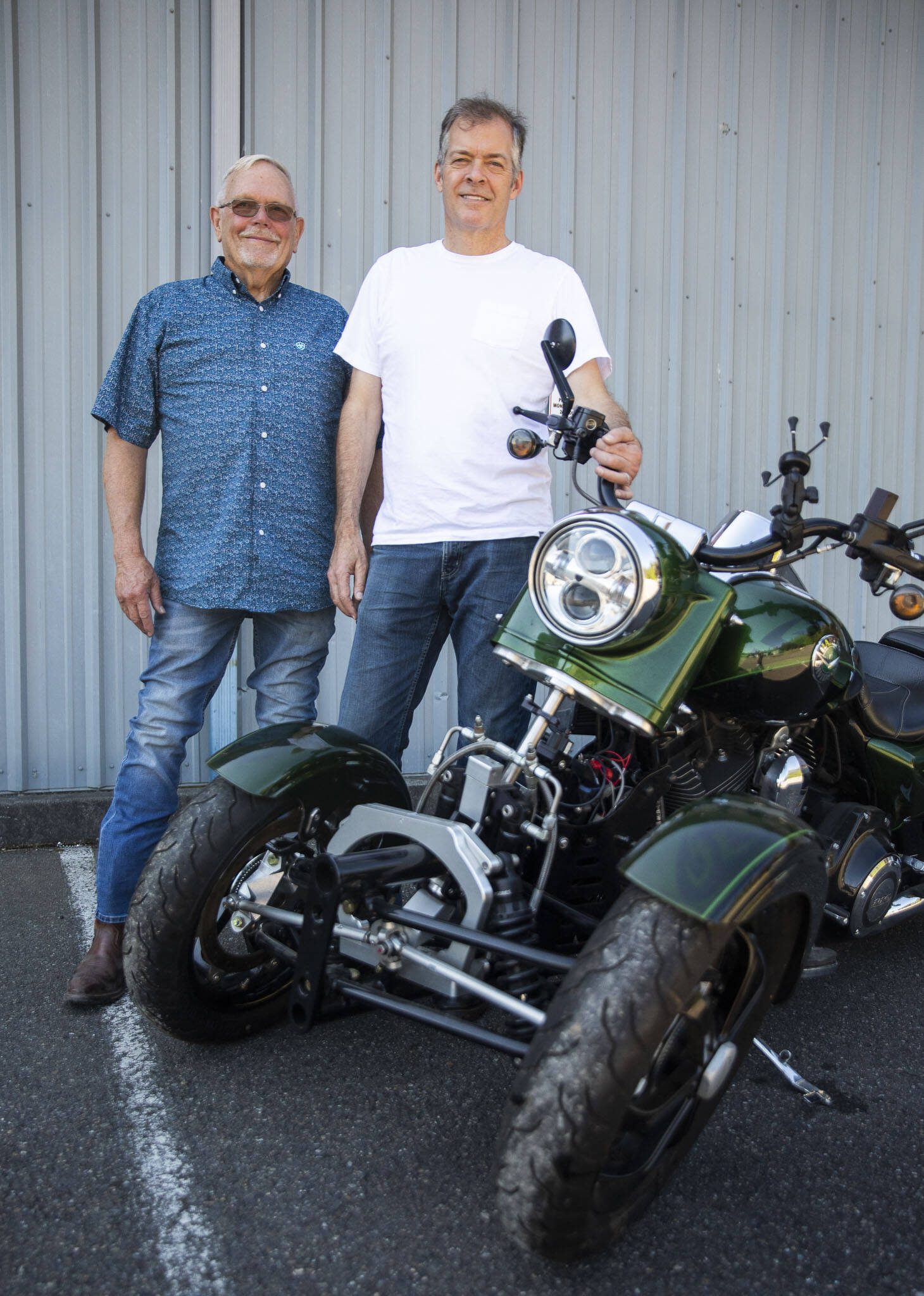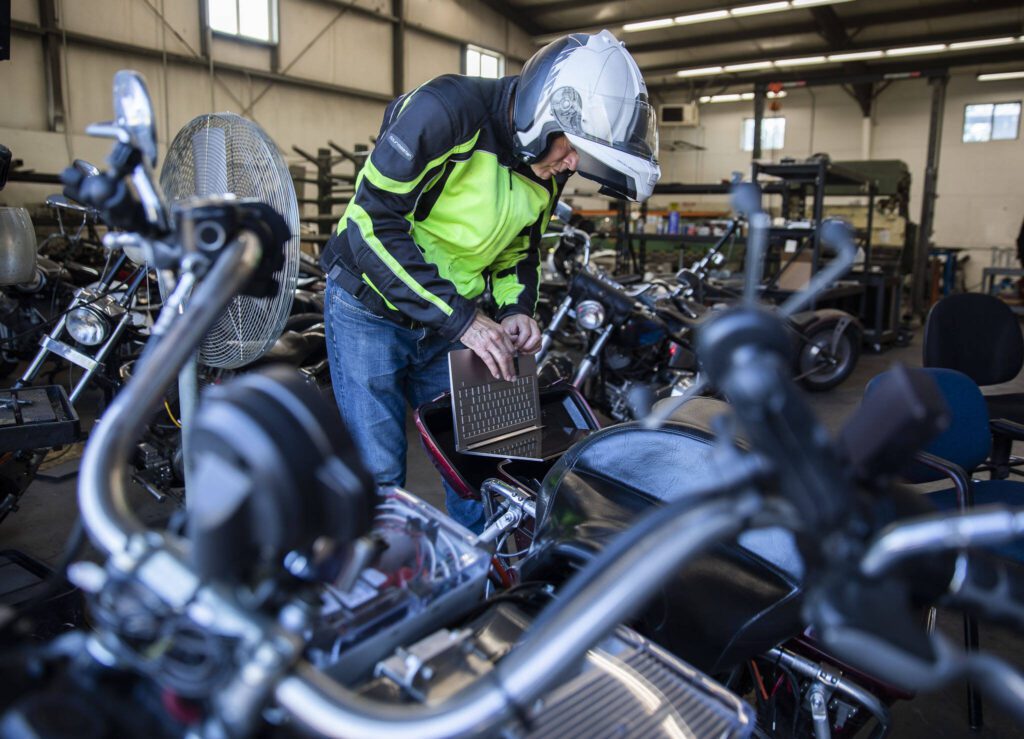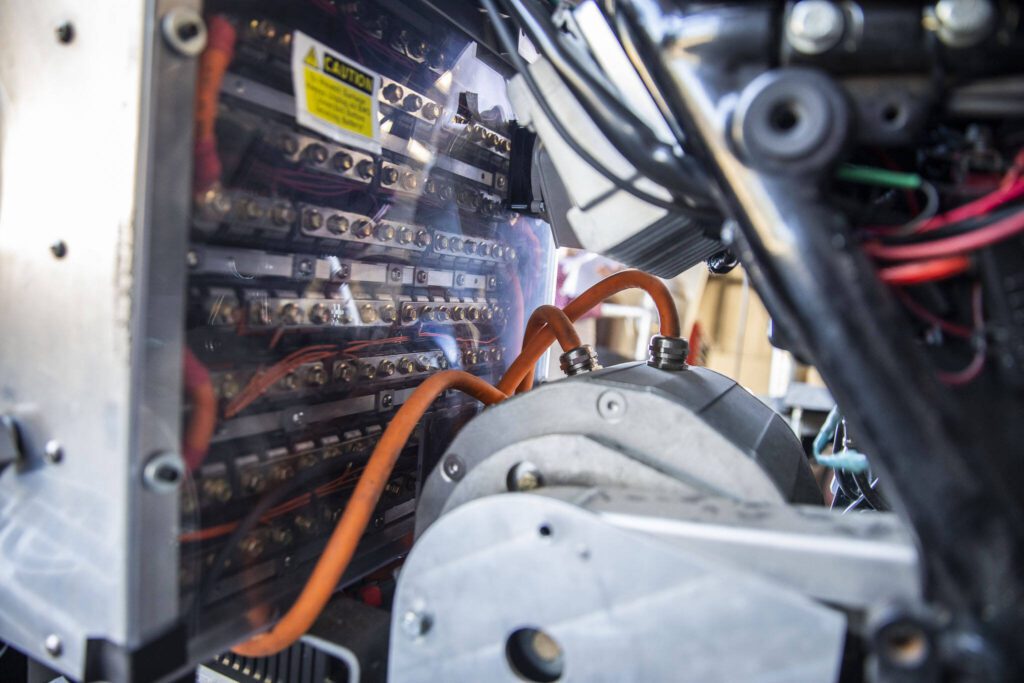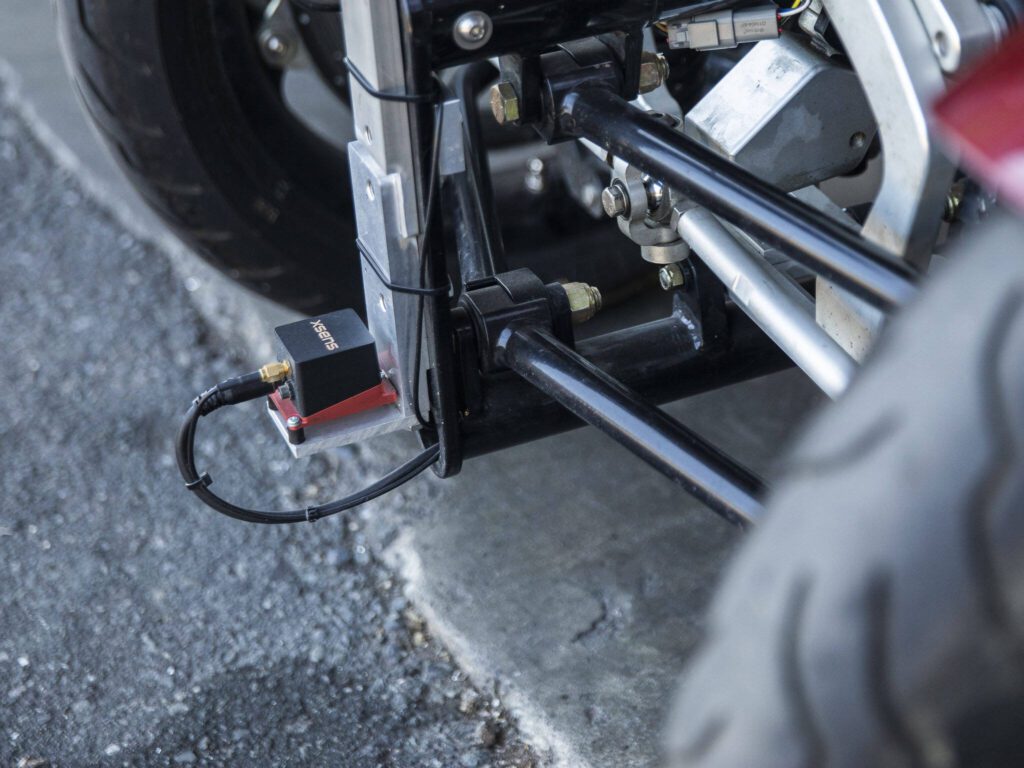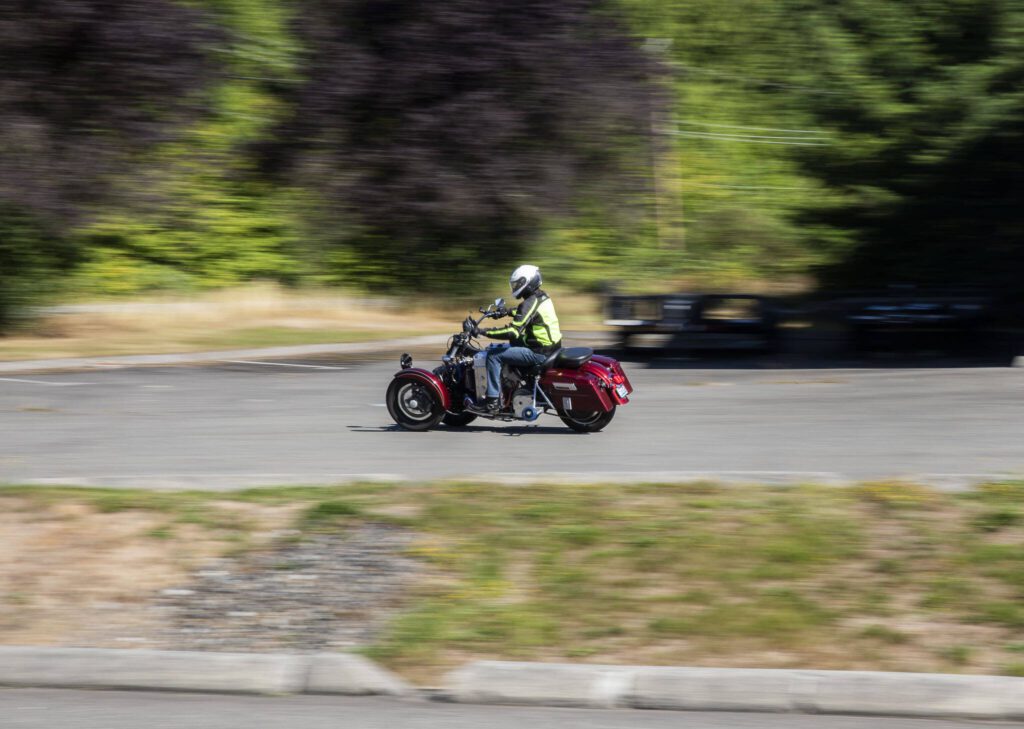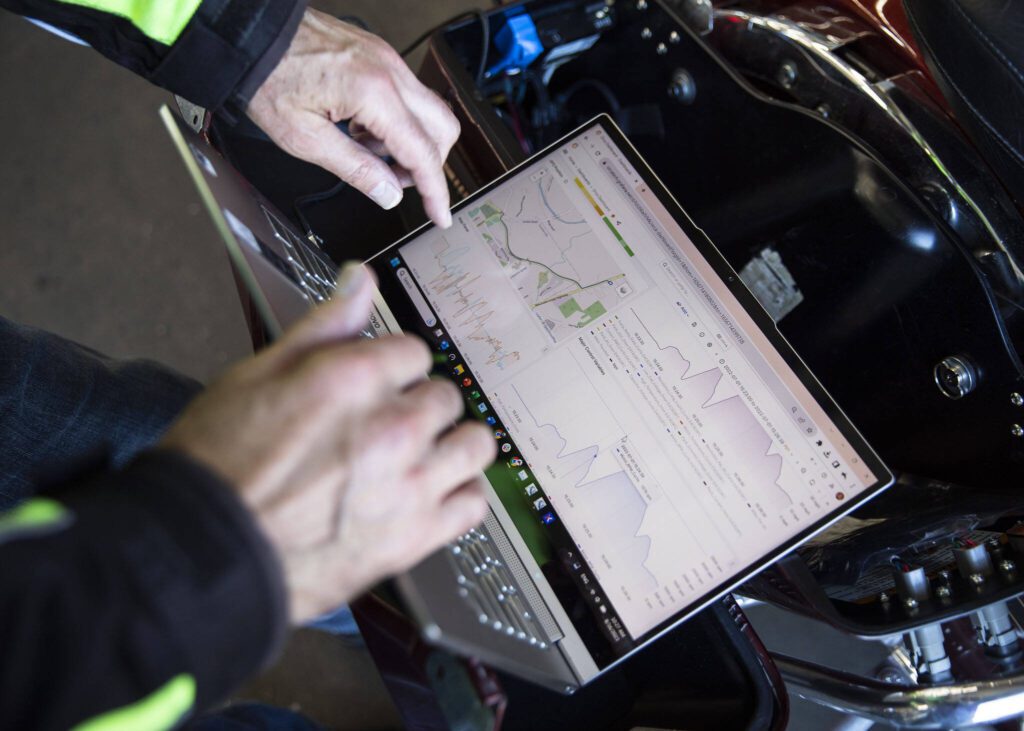GRANITE FALLS — Nothing is more frustrating to Bill Messing than seeing a big diesel-drinking box truck deployed to deliver a single case of wine or a box of office supplies.
Messing’s Granite Falls-based startup Orca Mobility aims to put an end to the excess labor, fuel and wear-and-tear those trips require.
His solution?
Develop a small self-driving electric truck built on a motorcycle chassis that can travel at highway speeds and navigate tight turns.
Wait, that’s only two wheels, right?
Not here. The motorcycle frame on which Orca’s cargo vehicle is based has three wheels — two in front and one in the rear. Here’s what sets it apart — like a motorcycle, the front wheels tilt, which means it can lean into a turn.
You can’t do that with a car or truck.
It also stands on its own when it comes to a stop, no kickstand necessary.
The configuration is based on patented technology licensed from a previous company in Snohomish that Messing and Mike Lowell, Orca’s lead designer, were partners in, called Tilting Motor Works.
Bob Mighell invented the trike’s unique front end.
There’s nothing else like it, said Messing, Orca’s founder and CEO.
Others, including some big carmakers and motorcycle manufacturers, have tried to develop a three-wheel vehicle that leans, but so far haven’t found success, Messing said.
The trike’s target customers were motorcyclists who wanted the stability of a three-wheeler, but yearned to lean into turns.
Jay Leno, who tested the trike on his reality TV show “Jay Leno’s Garage” summed it up: “If you were blindfolded and you were on this, you’d think you were on a regular motorcycle,” he said.
In 2021, Oregon company Arcimoto bought Tilting Motor Works for an estimated $10 million.
While still at Tilting Motor Works, Messing saw an opportunity to put Mighell’s invention to work — hauling cargo.
It took 18 months, but he negotiated a license all of the company’s intellectual property.
Founded in 2019, Orca Mobility occupies a corner of Cobalt Motorcycles’ warehouse in Granite Falls.
“What we’re doing is getting rid of the internal combustion engine, turning it into an electric vehicle and getting rid of the rider to make it an autonomous vehicle,” Messing said.
They’ve built a battery-powered prototype and are now focused on making it self-driving.
“It’s one step further, though a big step!” Messing said of the effort.
Why a trike?
A typical box truck emits 50 or 60 tons of carbon dioxide every year. In the United States alone there are four million of them on the road, Messing said.
“That’s 200 megatons —200 million tons of carbon dioxide — from these box trucks that are often running around 10% to 20% full,” Messing said.
Every day freight carriers and retailers regularly dispatch box trucks to drop off small payloads, a case or two of wine to a restaurant or a dozen auto parts between repair shops. They average about seven miles per gallon, Messing said.
By comparison, Orca, which weighs about 700 pounds, can travel 100 miles on a charge and carry about 400 pounds, roughly the capacity of a small SUV, he said.
At 114 pounds, the prototype’s battery pack is similar in weight to a standard motorcycle engine, Lowell said.
Messing, Lowell and a team of 10 hope to “displace millions of those box trucks and vans,” and replace them with a slender, self-driving EV with the footprint of a motorcycle, Messing said.
Orca has a front track width of about three feet.
“When your vehicle has a footprint that’s only three feet wide and eight feet long, it can go places, and do things that no other vehicle can,” Messing said.
“It can go through doorways or into a freight elevator,” he said.
It can navigate a business park or head out on the highway. And there’s the key, it can travel at a clip.
So, why not just make it a small four-wheeler ?
Simple answer. They don’t lean.
“Any vehicle this wide, whether it’s got three wheels or four wheels that can’t lean, falls over when it goes around a corner at speed, 100% of the time,” Messing said.
‘There are a lot of two- or three-foot-wide vehicles around the world that can go putt, putt, putt, but something that can actually travel 30-40-50-60 miles an hour does not exist on the road,” Messing said.
“This can travel highway speed and won’t require a driver,” he said, pointing to the company’s prototype.
Now make it self-driving
Making Orca an autonomous, self-driving vehicle is next. It starts with a rider and a zillion points of data.
“We’re riding it around and gathering the data,” Messing said.
Sensors attached to the trike collect data 100 times a second, measuring the steering angle, acceleration, lean angle and other functions, Messing said.
The rider’s every move teaches the software how to operate without a driver, Messing said.
A GPS system, accurate to one centimeter, also collects data.
“As you go into a corner, it measures the speed and the radius,” Lowell said. “So, when they’re programming it to run on the road by itself, they’ll know what data to put in.”
The next step is to feed the information “into a machine learning environment to teach it how to follow a particular path and go by itself,” Messing said. “The data really is the linchpin.”
Once the software “learns” to operate the vehicle automatically, the company plans to invest in the type of self-driving software that incorporates collision avoidance and traffic sign recognition.
Orca won’t be commercially available until 2025, Messing said.
Messing said he has talked to a number of delivery companies about how they might add Orca to their fleet.
They keep asking Messing the same question:
“Is it ready?”
Janice Podsada: 425-339-3097; jpodsada@heraldnet.com;
Talk to us
> Give us your news tips.
> Send us a letter to the editor.
> More Herald contact information.
